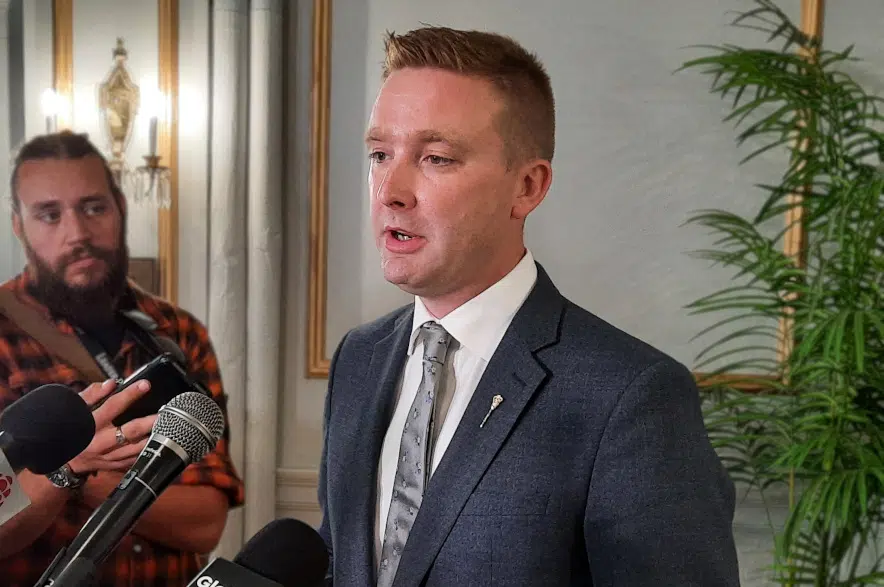After some procedural wrangling at the start of the week, the Sask. Party’s new “Parents’ Bill of Rights” has been introduced in the Saskatchewan Legislature.
The bill, the government said, outlines the rights parents have to make decisions around their children’s education and invokes the Charter’s notwithstanding clause “to ensure parents must provide consent if a child wants to change their gender identification in school.”
Using the clause was necessary after a judge granted an injunction blocking the policy. Justice Michael Megaw wrote that the policy had the possibility of causing “irreparable harm” to vulnerable children, and granted the injunction pending the outcome of a lawsuit still before the courts.
Immediately following the injunction, Premier Scott Moe announced his intention to use the notwithstanding clause to push through the policy despite the court order.
After it was introduced Thursday, Education Minister Jeremy Cockrill spoke in the rotunda, saying every piece of legislation the government brings forward has a lot of thought and consideration behind it.
“It’s about enshrining the right of parents to be involved in their child’s education,” said Cockrill.
The bill invokes the notwithstanding clause for the Charter of Rights and Freedoms, but also includes a section to override the Saskatchewan Human Rights Code and another section which attempts to protect the government, MLAs and school boards from lawsuits around possible harm that might result from the policies.
When asked, Cockrill compared the importance of parents being involved in their child’s education with the importance of the province’s human rights code.
“I think it’s justifiable because we want to ensure parents have rights in terms of being involved in their child’s education,” said Cockrill.
“It’s as simple as that.”
NDP Education critic Matt Love said the government including those points in the bill means the government knows the measure will trample over kids’ rights.
“It’s an indication that they know this policy will harm children, and they’re more interested in protecting themselves,” said Love.

Education Minister Jeremy Cockrill introduced the “Parents’ Bill of Rights” in the Saskatchewan Legislature on Thursday. (Lisa Schick/980 CJME)
The bill outlines a number of rights that parents have around their children’s education, including their right to act as the primary decision maker, the right to be regularly informed of attendance, behavior and academic achievement, and the right to consult with teachers and other school staff.
When it comes to gender identity, the bill says parents have a right to provide consent for students under 16 “before the pupil’s teachers and other employees of the school use the pupil’s new gender-related preferred name or gender identify in school.”
The legislation also requires that students who aren’t comfortable letting their parents know about their gender identity will have to be offered support by professionals to come up with a plan to get to the point where they are comfortable.
Cockrill said the government has been making investments in schools and in mental health supports in the community to help, though he admitted more work needs to be done.
“There’s obviously supports available in schools. There’s counsellors in schools. I’ve spoken numerous times now about the rapid-access counselling that we were expanding to children and youth,” said Cockrill.
But according to Love, there aren’t enough supports in schools and numbers show that those supports have actually been going down.
The bill also contains new parental rights around sex education.
According to the government, parents have the right to be informed – two weeks in advance – of “the subject matter of the sexual health content,” as well as the dates it will be presented.
Students can also be withdrawn from sex ed. lessons if the parent or guardian chooses, the provincial government said, by providing written notice to the school’s principal.
Other parental rights contained in the proposed legislation include the right to “excuse the pupil from participating in the opening exercises,” the right to be consulted prior to any dental or medical exams or treatment administered in school, and the right to serve as a member of the school’s community council.
Under the new legislation, parents will also have the rights to access to the student’s school file, be informed of the school’s policies around discipline and code of conduct, and be notified of any disciplinary or investigative action taken by the school involving their child or any issues around attendance.
The legislation does not include anything about another education policy change government announced in August, putting a pause on third-party presentations in sex ed. classes. Cockrill said that pause is still in place, but that particular policy will be dealt with through regulations rather than legislation.
The bill also doesn’t include any teeth that could be used if a teacher or school decided it didn’t want to abide by the new law.
Cockrill said that will be dealt with as school divisions develop their own implementation policies.
“There’s an expectation for school divisions to follow that policy, and school divisions are the ones that hire staff, and so we expect that they will demand that their staff follow this policy as well,” said Cockrill.
Meanwhile, Love – who worked as a teacher for more than a decade – said the government is going down a difficult path when it asks teachers and school staff to enforce a policy that he says go against the Charter and human rights code.
While the bill was introduced Thursday, debate won’t get started until Monday at the earliest.
The government wanted to amend the sitting schedule to lengthen the day to 14 hours and to sit on Friday and Saturday this week, but when the motion came up on Thursday NDP House Leader Nicole Sarauer stood and spoke for two hours, running out the clock on the motion.
She talked about the scheduling motion as well as the pronoun policy, and asked several times in several different ways why the government is in such a hurry to get the pronoun policy passed, instead of giving it the months of opportunity for scrutiny that bills normally have.
Love spoke afterward, saying the NDP is sending a message that it won’t let government shred the rules so that it can violate rights.
When asked why government was in such a hurry, Cockrill said the government is just doing what it said it would by passing the law, and that it’s an urgent issue for many parents.
Many have voiced their opposition to the provincial government’s push for greater parental rights and the decision to invoke the notwithstanding clause in order to do so.
Several large rallies have been held around the province opposing the measures, and the Saskatchewan NDP has signaled its intention to scrutinize the new legislation in detail.
“When the government is suggesting that they’re going to invoke the notwithstanding clause to – clearly put – upend human rights (and) charter rights, I think it’s incumbent on the official opposition to ensure that that bill has full scrutiny,” Saskatchewan NDP Leader Carla Beck said in a previous interview.
The government has offered a concession to the NDP by saying the bill will get twice the typical amount of debate time – 40 hours rather than 20.
You can read the full text of the bill here.
–with files from 980 CJME’s Lisa Schick











